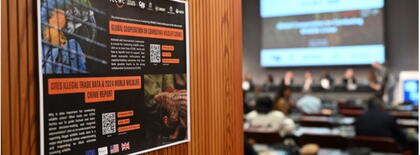FOLLOWING THE MONEY APPROACH: UNODC national workshop in Kenya and regional workshop for the Caribbean Region in Panama on "Recovering the proceeds from wildlife and forest crime"
Two workshops addressing “Recovery of Proceeds of Crime from Wildlife and Forestry Offences” were organised by UNODC from 24-28 November 2014, in Naivasha, Kenya, and 1- 4 December 2014 in Panama City, Panama.
The workshop in Naivasha, Kenya was a practical case-study based workshop, hosted by the Government of Kenya in cooperation with the Office of Director of Public Prosecutions Kenya (ODPP), the Norwegian Agency for Development and Cooperation, the Basel Institute on Governance and INTERPOL. It brought together over 40 participants, including prosecutors, investigators, customs, Kenya Revenue Authority, magistrates, wildlife authorities and other relevant agencies from Kenya in order to better address and trace the proceeds from wildlife and forest crime as well as to raise awareness of the importance of using financial investigation and anti-money laundering techniques to tackle this transnational organised crime.

The regional workshop for the Caribbean region, in Panama, was jointly organised by UNODC’s Global Programme for Combating Wildlife and Forest Crime (GPWLFC) and the Global Programme against Money Laundering, Proceeds of Crime and the Financing of Terrorism (GPML). The workshop was organised in cooperation with the Bureau of International Narcotics and Law Enforcement Affairs, the Norwegian Agency for Development and Cooperation, the Basel Institute on Governance, INTERPOL, CFATF, TRAFFIC / WWF, CARIN and AML Solutions International. This four-day workshop was attended by 8 countries with 21 delegates from the Caribbean region.
Both events provided an opportunity for participants to better understand the situation with regards to wildlife and forest crime and the applicability of the relevant legislation. In addition, the workshops created a platform to discuss the use of investigative tools, freezing and management of assets, money laundering prosecutions, calculation of confiscation, Mutual Legal Assistance and the importance of international cooperation.
The main outcomes and recommendations of the workshops include the following:
- Recognition of the importance and necessity of cross-border and inter-agency cooperation as well as of strengthening regional networks to effectively deal with wildlife/timber crime cases and to track and confiscate its proceeds;
- Improved knowledge on money-laundering activities and prosecutions and the process of case analyses;
- Improved knowledge of national legislation and drafted legislative documentation, which may be used in future cases;
- Raised awareness of countries' legislative weaknesses and enhanced capacity to address gaps;
- Plans to organise training and capacity building activities for judiciary, prosecutors and investigators;
- Plans to develop a manual for prosecutors and investigators dealing with proceeds of crime in wildlife/timber cases;
- Expected follow-up activities and training within participants' respective organisations.
United Nations Office on Drugs and Crime
Vienna International Centre
Global Programme for Combating Wildlife and Forest Crime
Sustainable Livelihoods Unit
P.O. Box 500, 1400 Vienna, Austria
Email: WLFC [at] unodc.org (WLFC[at]unodc[dot]org), Tel:(+43-1) 26060-83040, skype / unodc.slu




